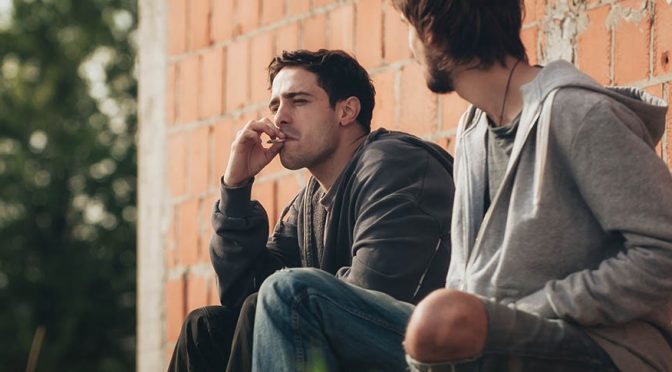What have we learned 10 years after the deaths of Levy Thamba and Kristine Kirk? We ask that question as April 15, the tenth anniversary of Kristine’s death, approaches. Unfortunately, the USA continues to make critical mistakes by allowing the expansion of marijuana. One problem is the increasing number of violent episodes related to cannabis-induced psychosis. Some incidents made the news this year, including four stabbings in Rockford, IL.
Another issue is that states legalized pot without guardrails to deter stoned drivers, resulting in a huge increase in traffic deaths.
This article covers some of the many psychotic events and tragedies related to THC in the early legalization states of Colorado, Washington, Oregon and California.
Colorado Cases
Levi Thamba Pongi,19, jumped three stories to his death after eating a marijuana cookie in Colorado on March 11, 2014. Thamba, an exchange student from the Congo, traveled from Wyoming to Colorado two months after Colorado legalized pot. The report listed marijuana intoxication as a significant contributor to his death.
Richard Kirk of Colorado killed his wife on April 15, 2014, after ingesting marijuana candy. Before it happened, Kristine Kirk called 911 and explained her husbands was hallucinating and wanted her to kill him. Just minutes before police arrived, he shot his wife. Three children witnessed the event and are now in the custody of Kristine’s parents. Kirk is serving a 30-year sentence for the crime.
Luke Goodman, 23, traveled to Colorado with his family and tried marijuana Colorado on March 21, 2015. When two edibles did not affect him, he took three more. Several hours later he shot himself and died three days later. The family believes that marijuana was the cause of his suicide.
Daniel Juarez‘s family believes cannabis intoxication caused his death. He stabbed himself multiple times under acute intoxication on September 26, 2012, weeks before the vote to legalize. Had the report been made public, some say Coloradans never would have voted for legalization. He was 17 at the time.

Cases from Washington
Hamza Warzame, 16, Seattle, jumped 6 floors to his death after smoking marijuana for the first time with a 21-year-old friend in 2015. At first, police investigated a possible hate crime because Warsame was a Muslim. The cannabis was purchased legally in a Seattle recreational pot store, but it was illegal for Warsame to be using it. He may have been trying to jump from building to building, without trying to kill himself.
Joseph Hudek – a man from Tampa, Florida — purchased marijuana edibles in Seattle before going on a flight from Seattle to Beijing. He tried to open a door during the flight. When an attendant and passenger were helping to subdue him, he punched them. In an affidavit, he said that he ingested the drugs in Seattle before getting on the plane. Perhaps Hudek expected Seattle pot to mellow him and put him to sleep during the overseas trip. In the recent incident of an off-duty Alaska Airlines pilot trying to take over a plane, the man actually was actually tripping on psilocybin mushrooms, another hallucinogen.
Crystal Daniels, of Washington, drove her vehicle into a utility pole around 1:40 AM on June 17, 2015. The crash caused power lines to fall to the ground and resulted in “about a hundred yards of flames.” When King County sheriff’s police arrived at the scene, they had to pull her out a back window of the vehicle. She was completely naked and babbling incoherently. The electricity outage affected about 4000 residents in Shoreline, a city about 10 miles from Seattle. She had 28 ng of THC hydroxyl in her blood and 8.5 ng. of THC.
Missing teens in Washington and Oregon
Logan Schiendelman went missing at age 19, back in May 2016, from Tumwater, Washington. His story has been told on Dateline and on the Missing Persons podcast. One of the few things noted about Logan that could relate to his disappearance was his marijuana usage. His grandmother also said: “I know he did a lot of smoking pot, and I’ve wondered sometimes if that caused a little bit of paranoia.”
Brandon Powell, an 18-year-old from Estacaba, Oregon had a panic attack after taking a highly potent marijuana dab in March 2017. He left home in his pajamas and search missions found dead in a river one month and a half month later in a river. Dabs are a highly potent form of marijuana that is more popular with teens who use marijuana than with adults.
California drug normalization; teen parties with heavy marijuana use
On May 28, 2018, Chad O’Melia and Bryn Spejcher were smoking marijuana out of a bong in southern California. Bryn became acutely psychotic and stabbed Chad over 100 times, ending his life. She also stabbed herself and her dog. The Bryn Spejcher trial was covered in numerous news outlets earlier this year. A judge sentenced her to probation and community service, even though the jury convicted her of involuntary manslaughter. Numerous podcasts discuss the trial, including Every Brain Matters and Dr. Daniel Bober.
Cases in California confirm the failures of the state’s harm reduction approach to drug education. Both Kiely Rodni, 16, and Karlee Lain Gusé, 16, went missing after attending teen parties featuring heavy marijuana use. Keili was found in a submerged car two weeks later, although Karlee has never been found. Keili’s death was probably accidental. The toxicology report on Kelli revealed caffeine, nicotine, and Delta-9 THC. A review of Karlee’s tragic disappearance suggests impairment from THC, but also the possibility that she may have been harmed. The FBI has a long case file with testimony from the family.
Autopsies listed “drowning” as the official cause of death for Keili Rodni, Jelani Day and Brandon Powell, but would they have drowned without the THC? Probably not! The bottom line — with or without psychosis — marijuana raises your odds of death by accident or otherwise.
Odd cases of psychosis in Colorado
In the Denver Mall, a homeless man started physically attacking people with a PVC pipe, in June, 2016. The 28-year-old man had moved from Indiana to Colorado for marijuana. Mayor Michael Hancock, blamed the rash of violence on the 16th Street Mall on legalized marijuana. “This is one of the results of the legalization of marijuana in Denver, and we’re going to have to deal with it.”
Robert Corry, the attorney behind Colorado’s successful legalization ballot in 2012, later regretted pushing legalization. He himself went crazy, and he suffered from cannabis-induced psychosis. Corry went from being the pot advocates’ favorite lawyer to having his law license suspended for one year.
What have states learned? Nothing
Perhaps Virginia’s governor, Glenn Youngkin, and New Hampshire’s Governor Chris Sununu have learned lessons from other states. Only two states, Vermont and Connecticut, cap the potency of THC. States like California and Washington refuse to pass sensible regulations about warning labels. They care more about pleasing wealthy donors invested in the cannabis industry. Too many lives have been destroyed.
Pot advocates who claim teen use doesn’t rise with legalization remain silent about the use of high-potency THC products promoted since legalization. Part 2 will cover psychotic episodes in other states.




